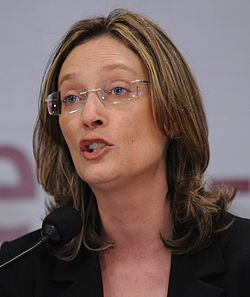- Maria do Rosário
-
Maria do Rosário 
Maria do Rosário on September 2009. Federal deputy for Rio Grande do Sul In office
1 February 2003 – 31 January 2011State deputy for Rio Grande do Sul In office
1 February 1999 – 31 January 2003Personal details Born Maria do Rosário Nunes
November 22, 1966
Veranópolis, Rio Grande do SulPolitical party Workers' Party Other political
affiliationsCommunist Party of Brazil (1989-1992) Spouse(s) Eliezer Pacheco Alma mater Federal University of Rio Grande do Sul Profession Teacher Website Mariadorosario.com.br Maria do Rosário Nunes (born 22 November 1966) is a Brazilian teacher and politician. Graduated in pedagogy from the Federal University of Rio Grande do Sul and postgraduated from the University of São Paulo, she currently serves as a federal deputy for the state of Rio Grande do Sul for the Workers' Party. On 8 December 2010, she was appointed by President-elect Dilma Rousseff to succeed Paulo Vannuchi as the Special Secretary for Human Rights.
Career
Maria do Rosário Nunes was born on 22 November 1966 in the municipality of Veranópolis. In her youth she was an active member of the student's movement.[1] Later, as a teacher in public schools, Maria do Rosário became active in the trade union movement.[1] A graduated teacher, she got a postgraduation degree in domestic violence by the Laboratory for Child Studies of the University of São Paulo.[1]
As a member of the Communist Party of Brazil, Maria do Rosário was elected to the Porto Alegre City Council for the 1993-1996 term with 7,555 votes. The following year after her inauguration, she migrated to the Workers' Party. In 1996, she was reelected with over 20,000 votes, becoming the top voted councilor that year. During her two terms as councilwoman, Maria do Rosário acted as president of the education and human rights committees.[1] Her second term at the Porto Alegre City Council was interrupted after she was elected to the Legislative Assembly of Rio Grande do Sul with over 77,000 votes in 1998. That year, she became the second top voted state deputy of Rio Grande do Sul. As a state deputy, she acted as chairwoman of the citizenship and human rights committee and vice-president of the Legislative Assembly for two years.[1]
The following election, Maria do Rosário was elected for a seat in the Chamber of Deputies after receiving over 140,000 votes. She was reelected in 2006 with 110,000 votes. Both times she was among the top voted candidates in the state.[1] In the National Congress, she served as the rapporteur of the Parliamentary Commission of Inquiry which investigated people responsible for sexual exploitation of children.[1] Maria do Rosário represented the Chamber in the Commission on Political Deaths and Disappearances during the military dictatorship and acted as chairwoman of the Special Committee for the Adoption Bill.[1] Since 2003, she coordinates the Parliamentary Front in Defense of the Children's Rights, in addition to serving as vice-chairwoman of the human rights and education committees.[1] In 2009, she was the chairwoman of the education committee, having coordinated a series of debates about the new National Education Plan, which sets the goals for the area for the period spanning from 2011 to 2020.[1]
On 2004, Maria do Rosário was a candidate for deputy mayor on the ticket headed by fellow party member Raul Pont. Their defeat brought an end to the Workers' Party sixteen year run in the City Hall. On 2008, she was the mayoral candidate, having lost to incumbent mayor José Fogaça, in spite of advancing to the second round in a heavy race. During her tenure in the Chamber, she was also a candidate for the presidency of the Workers' Party, having lost to Ricardo Berzoini. Nevertheless, she acted as the party's vice-president from 2005 to 2007.
During the 2010 elections, Maria do Rosário was declared ineligible by the Regional Electoral Court due to some debt problems found on her 2008 campaign.[2] She filed an appeal against this decision in the Superior Electoral Court, where he was acquitted of the charges against her and declared eligible.[3] The final decision, however, was only released a day after the elections, and her votes were not considered in the original counting. After the Superior Electoral Court's decision, it was revealed that Maria do Rosário had been reelected for a third term with more than 146,000 votes, being the sixth top voted candidate in the state.
On 8 December 2010, President-elect Dilma Rousseff appointed Maria do Rosário to succeed Paulo Vannuchi as head of the Special Secretariat of the Presidency of the Republic for Human Rights, a ministerial-level cabinet office. Although she did not indicate priorities, the press points the battle against homophobia[4] and the establishment of truth and reconciliation commissions to investigate the crimes practiced by public office holders during the dictatorship among her top priorities.[5] It is also expected that Maria do Rosário, acting as Special Secretary, will work for the Brazilian government to fulfill the veredict of the Inter-American Court of Human Rights against the country's amnesty law.[5]
References
- ^ a b c d e f g h i j (Portuguese) "Secretaria de Direitos Humanos da Presidência da República - Maria do Rosário". Portal Brasil. 8 December 2010.
- ^ (Portuguese) Ogliari, Elder. "Justiça barra candidatura de Maria do Rosário no RS". Estadão. 3 August 2010.
- ^ [1]
- ^ [2]
- ^ a b (Portuguese) Agência Estado. "Maria do Rosário herda briga com Nelson Jobim". Estadão. 19 de dezembro de 2010.
External links
Categories:- 1966 births
- Brazilian women in politics
- Living people
- LGBT rights activists from Brazil
- University of São Paulo alumni
- Workers' Party (Brazil) politicians
Wikimedia Foundation. 2010.
